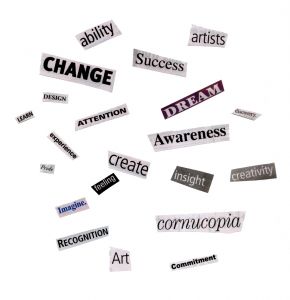Wordsmithing: Go For It
Individually they’re just symbols on a page. Meaningless, really.
But when you string them together into a sentence that conjures up feelings and images, THEN you have something.
That’s what I call creative wordsmithing.
We’re all capable of it if you put forth a little effort. True, some are better at it than others, but I guarantee you your writing will improve the more you give creative wordsmithing a fair shot.
Take the word “ever.”
Alone it’s somewhat elusive. Is it an adverb? An adjective? Honestly, I can never remember.
But when you add it to your writing for emphasis, and at the same time switch out dull words for colorful verbiage, your writing moves up a notch.
For example, if you write, “That’s a pretty sunrise,” that adds nothing to the moment, because let’s face it, most sunrises are beautiful.
But if you say, “Have you ever seen such a striking sunrise?” Now you’ve made it a personal challenge for your reader.
Maybe they think about standing at the top of Mt. Haleakala in Maui, ten thousand feet up in the middle of the Pacific Ocean, witnessing the first rays of a new dawn. The sunrise strikes its audience with all the power of Mother Nature. Its brilliance comes at everyone with the speed of light! … Somehow “That’s a pretty sunrise,” just doesn’t cut it. I’m sure you could do better.
In another example, let’s say you want to write about your family and you jot down, “I want my kids to be happy.” Admirable, but really, who doesn’t want that?
But if you write, “I hope my kids live happily ever after.” That is so much more romantic, and yes it’s a little cliché, but in kind of a retro, Disney sort of way that anyone who grew up in the latter half of the twentieth century could appreciate. It definitely animates one’s imagination in ways that “I want my kids to be happy” just doesn’t do.
And, by the way, if you happen to be recounting a conversation with your kids that’s the perfect time to go a little insane with your prose.
Instead of writing something like, “Your room is dirty again. Clean it!” Throw in irony and exaggeration to wordsmith the sentence into, “Are you ever going to clean your room in my lifetime?” That adds an element of anxiety that we can all relate to either as parents, or as kids from when our parents nagged us.
Suddenly that sentence goes from an observation to an experience, making your audience feel instead of just hear what you have to say.
Good Writing Trumps All
I tell my kids if you can write and speak well, you have the potential to do whatever you want in life. With these two skills you can persuade, teach, entertain, campaign, invent, lead, inspire, and even change the world. Because creative wordsmithing makes people pay attention to your message.
From Hitler or Ghandi, a personal point of view is what we humans crave. We want to experience the noticeable effects of your fingerprints all over your writing, so much so that NO ONE else in the world could’ve conveyed what you have to say in exactly that way.
But you may argue that creative wordsmithing is hard because when you sit down to write, that blank page intimidates you with the spitefulness of a schoolyard bully.
How dare you think you can write something that other people want to hear? You cringe and allow yourself to be browbeaten into a corner muttering that tired mantra “I’m totally speechless. I don’t know what to say.”
But THAT is the precisely the moment you have something to say that we want to hear. At that moment your filter is gone, your guard is down, your emotion is raw, and your opinions are true.
So when you sit down to write let your mind go back to a situation, even if it’s painful, that rendered you speechless. Because when your brain goes mute, that’s when you can finally speak from the heart, crafting those beautiful sentences that can only come from you.
The Masters Got It Right
And if you still think creative wordsmithing is not worth the effort, let me leave you with this:
Out, out brief candle
Life is nothing but a poor player
That struts and frets his hour upon the stage
And then is heard no more.
It’s a tale told by an idiot, full of sound and fury
Signifying nothing.
Contrast that with:
Life is short and then you die.
I promise you, Shakespeare would’ve won a lot of Toastmaster competitions…and maybe even a Pulitzer or two.
—
Stacy Dymalski is the author of four books, the most recent being the hilarious Confessions of a Band Geek Mom. She’s also a stand-up comic, an award-wining public speaker, and teaches self-publishing at the University of Utah. She lives in Park City, UT, with her husband and two (band geek) sons.
Visit her website at www.stacydymalski.com.
Subscribe to her humor blog From Nonsense to Momsense
Follow her on Twitter @StacyWriteNow
LIKE Confessions of a Band Geek Mom‘s Facebook fan page.
Category: On Writing, US American Women Writers




























I have always loved the idea of words as a construction material, that we shape into different forms. Thanks for the thought provoking post.
Hi Stacy,
Thanks to you, I am going to toy around a bit more with the word “ever” in the future–it seems way underrated! You’ve shown just what a well-targeted ever can do (slay messy children with sarcasm, for instance. Too bad my messy child is grown and out of the house now, just when I’ve learned how to throw my ever’s around.)
I did appreciate your post! Like all your other respondents, I take encouragement from your words in facing down the blank, bullying page. It *is* an awful big bully at times. My own difficulty lies in locking myself into sentences before I’ve let myself be “raw,” I think…
Thanks again!
When the filters are off, the emotion is raw and the opinions are true.
Thank you for your post. I’d never thought of it like that, but your are absolutely right. I sometimes find it difficult to revisit those hard places in order to write with true feeling but it is true that it’s only when I overcome that reluctance that I can write from my heart. It is well worth the pain and effort.
Thank you for this post.
I’m so glad you found that little bit of insight helpful, Gill! Yes, I admit it’s sometimes hard to get into the “zone” of where you can write with honesty, but it definitely makes what you have to say more interesting if you can. Also, I’ve found that the older you get, the more wear and tear you have on the fabric of your life, but it’s those flaws and imperfections that give depth to your voice. Those battle scars allow you to be genuine. That’s why you don’t want to shy away from them when you write!
In an age when expression can be counted in characters, thank you for supporting the value of painting word pictures! Enjoyed your article; happy to share it.
Thanks, Wendy! I agree that with the brevity the Internet promotes we sometimes lose sight of the art of the written word. Why just write phrases when you can express emotions?
Great article! I’ve always viewed wordlessness as a dead end, something to skedaddle away from as quickly as possible. I never really considered your point, that when your brain goes mute, that’s when you can finally speak from the heart. I like it.
Thanks for your comment, Missy. Over the years I’ve found that honesty in your writing speaks volumes to your readers. The trick is to be able to get to that place where you can be honest without being preachy or pretentious. I guess if it were easy everyone would be doing it, right? Practice makes perfect, which is why we just need to keep writing!